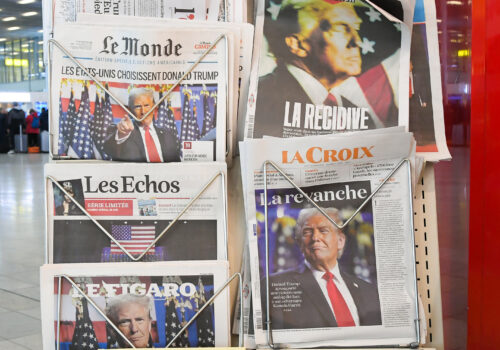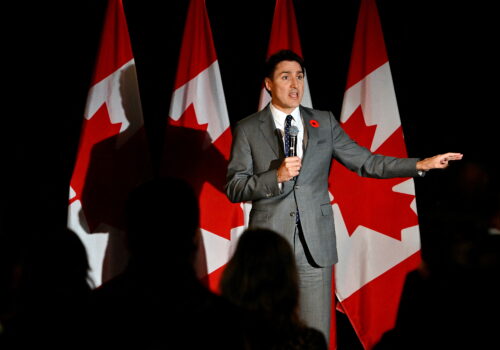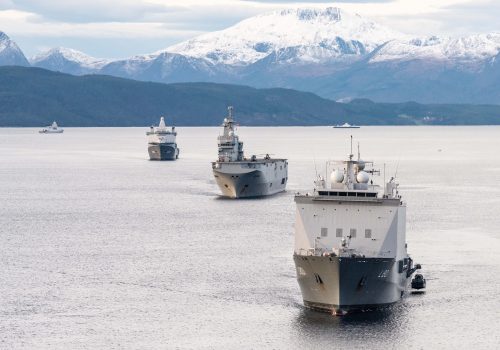Everything you need to know about Trump’s Greenland gambit
He’s plotting an Arctic acquisition. As he prepares to take office on January 20, President-elect Donald Trump is already stirring up a transatlantic tempest with his overtures to acquire Greenland. Denmark has repeatedly said its strategically located island territory is not for sale, but Trump on Tuesday continued to push the issue—including threatening tariffs on Denmark. The icy dispute raises several burning questions. Our experts have the answers.
1. What is Greenland’s strategic significance?
Greenland is strategically significant for a few reasons. First, it has mineral, natural gas, and oil wealth. According to the European Commission, twenty-five of the thirty-four “critical raw materials” it identifies as important to Europe’s future are found in Greenland, including those used to make batteries, wind turbines, and electric vehicles.
Second, the Arctic is geopolitically hot (no pun intended). The region is home to minerals, as well as massive oil and gas reserves—most located on Russian territories—and there’s a potential for some sort of future economic confrontation, especially as climate change exacerbates melting ice and changes the nature of shipping lanes.
Finally, Greenland is home to the United States’ Pituffik Space Base, which permanently houses both the US military and its ballistic missile early-warning system. The shortest route from the United States to Europe runs through Greenland, hence the importance of this specific location.
—Rachel Rizzo is a nonresident senior fellow at the Atlantic Council’s Europe Center. Her research focuses on European security, NATO, and the transatlantic relationship.
Greenland indeed has strategic significance, which is why the United States sought and obtained extensive defense cooperation and basing rights there in 1951, through the Defense of Greenland Agreement. If that agreement, and subsequent supplemental agreements, are not working or are inadequate, Trump can make that case. But he has not done so. Instead, he spoke at the January 7 press conference as if those agreements, and the existing US base in Greenland, do not exist.
—Daniel Fried is the Weiser Family distinguished fellow at the Atlantic Council and a former US ambassador to Poland.
2. Why is Trump focused on Greenland right now?
Trump’s recently renewed interest in Greenland should come as no surprise to observers of the incoming administration’s foreign policy agenda. Given the incoming president’s appreciation of history and motivation to settle outstanding scores, the strategic acquisition of Greenland should be viewed as a natural first option to expand US territory in North America while securing his place in the history books.
A secondary yet equally important aspect of the Trump team’s focus on Greenland is the island’s rich mineral reserves and possible future as an alternative to China’s existing near-monopoly on rare earth minerals. Coupled with increased Russian activity in the region and China’s stated objective of becoming a near-Arctic state, the incoming administration undoubtedly views securing Greenland firmly within the US sphere of influence as a national security priority.
—Christian Bjørn Følsgaard is a senior advisor to the Atlantic Council’s Scowcroft Strategy Initiative within the Scowcroft Center for Strategy and Security.
3. What do Denmark and the rest of Europe make of all this?
As a matter of logistics, Trump couldn’t just “take over Greenland.” It’s a semi-autonomous part of Denmark, with its own prime minister, yet governed by Denmark’s constitution. That means any changes to its status require a constitutional amendment. Greenland does have the right to declare autonomy through a referendum. However, according to Danish researcher Ulrik Pram Gad, “Greenland is talking about becoming independent from Denmark, but no Greenlanders want to just switch to a new colonial master.” Further, full autonomy would mean Greenland would lose its association with Denmark, a wealthy member of the European Union, and a country upon which Greenland relies for annual subsidies.
If Trump is serious about this move—and so far, it appears that he may be—the incoming administration should be ready for a serious fight. Conservative politician Rasmus Jarlov, who heads the Danish parliament’s defense committee said on X, “To the extent that U.S. activities aim to take control of Danish territory, it must be prohibited and countered. Then they can’t be there at all.” German Chancellor Olaf Scholz and French Foreign Minister Jean-Noël Barrot also both warned against any moves by Trump, with Scholz explicitly saying: “The principle of the inviolability of borders applies to every country, regardless of whether it lies to the east of us or the west, and every state must keep to it, regardless of whether it is a small country or a very powerful state.” This comment is reminiscent of language used to refer to Russia’s invasion of Ukraine.
—Rachel Rizzo
4. What is the endgame for Trump?
Europe-watchers should expect Trump and his team to get hooked on this idea of acquiring Greenland. That means it will not only be a source of transatlantic contention for the next four years, but could also be used as an attempted bargaining tool in Trump’s economic confrontation with Europe.
—Rachel Rizzo
Trump’s threats may be mere trolling. Trump seems to relish saying things that send people scurrying, chattering, and expressing outrage. Trump may also be seeking, as former Congressman Tom Malinowski shrewdly suggested, to distract from the difficulty of fulfilling the promises that got him elected, like lowering prices.
Trump’s threats may also be designed to throw Denmark and Greenland off balance as a prelude to some sort of negotiation under pressure, which Trump can then tout as a success for “America First.”
In no case is the United States likely to start wars against allies and friends. For one thing, Trump would own the consequences, which would include hostile populations under occupation, a ruined NATO alliance system, and US isolation from its friends, to the delight of its adversaries Russia and China. Trump won election promising to end wars, not start new ones.
—Daniel Fried
While the president-elect’s desire to purchase Greenland outright may seem outlandish, former Trump administration officials have made convincing arguments for the island to enter into a free association compact with the United States in the event it decides to seek independence from Denmark, thereby securing its territorial integrity while achieving national independence.
—Christian Bjørn Følsgaard
5. What does this say about Trump’s approach to global affairs for the next four years?
This isn’t the first time Donald Trump has pitched the idea of buying Greenland. This happened during his first term, but he was rebuffed by everyone—including Greenland and Denmark. He sees his second term as a chance to both finish what he started the first time around and to return to the global stage with a “rule with an iron fist” approach to geopolitics. If President Joe Biden made a 180-degree turn for US foreign policy when he entered office, promising allies and partners that “America is back,” expect that approach to turn 180 degrees in the opposite direction.
—Rachel Rizzo
On a deeper level, Trump’s threats of war and annexation speak to a way of thinking about power in the world that goes back to the nineteenth century and before—power through territorial conquest—and turns away from US grand strategy starting in the twentieth century.
US grand strategy after 1945 was based on the idea that the United States could be a friend of all nations that shared its core values, and it has brought generations of general peace and prosperity. No doubt this strategy needs another adjustment to meet the times. But throwing out US grand strategy in favor of war, territorial conquest, occupation, and threats would not make the United States great again. It would make the United States a mere mimic of Putinism and a reflection of the mid-twentieth century aggressor nations of Germany, Italy, and Japan.
Trump’s threats may be bluster or tactical, but they reveal a dark side of power unworthy of any US president. Put into practice, they would reduce the United States to a mere bully that rules through force and fear, assuredly triggering a reaction against it, as well as ending US alliances. That’s quite a degeneration from the tradition that Trump inherits.
—Daniel Fried
Further reading
Fri, Nov 8, 2024
What the world thinks of Trump’s return to the US presidency
New Atlanticist By
From Ukraine to Australia, Sweden to Singapore, Atlantic Council experts examine how people in different countries view the decisive win by President-elect Donald Trump.
Mon, Jan 6, 2025
Justin Trudeau is out. Here’s how the next Canadian prime minister can bolster US-Canada ties.
New Atlanticist By Imran Bayoumi
Whoever follows Trudeau as prime minister should focus on three specific areas that will be central to US-Canada relations in the year ahead.
Tue, Nov 5, 2024
How Sweden and Finland’s membership in NATO affects the High North
Issue Brief By Anna Wieslander
This issue brief explores the impact of Sweden and Finland’s NATO membership on the High North. Having Sweden and Finland in NATO strengthens the influence of the Alliance in the High North, as it responds to Russia's military buildup and China's regional interests. Deterring aggression while maintaining Arctic stability amidst rising geopolitical tensions will require new defense priorities and enhanced Nordic collaboration.
Image: Donald Trump Jr. visits Nuuk, Greenland, on Tuesday, January 7, 2025. Donald Trump Jr. is on a private visit to Greenland. Emil Stach/Ritzau Scanpix/via REUTERS


